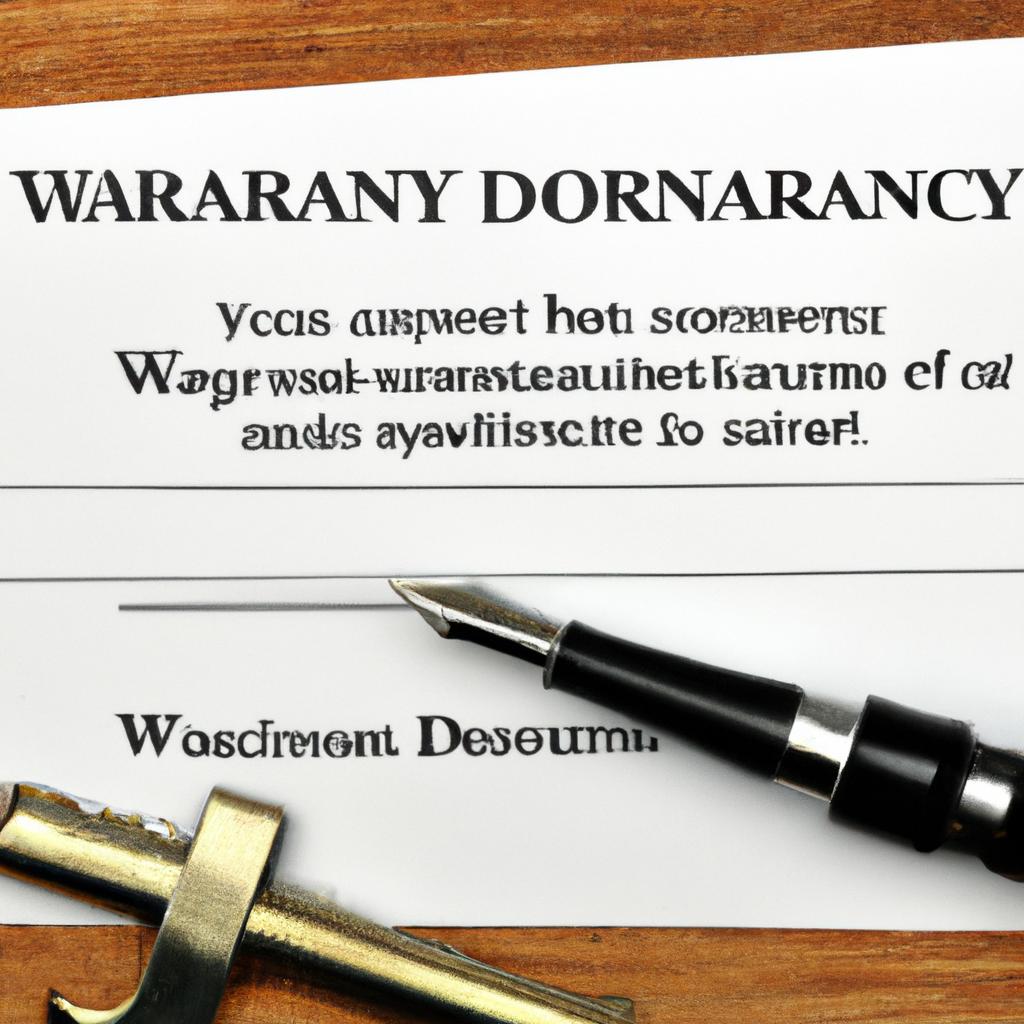In the intricate and often convoluted world of real estate transactions, the distinction between a warranty deed and a quitclaim deed can mean all the difference. As seasoned legal experts at Morgan Legal Group based in the bustling city of New York, we pride ourselves on unraveling the complexities of estate planning and property transfers. Join us as we dissect the nuances between these two types of deeds, shedding light on their implications and guiding you through the labyrinth of real estate law.
Key Differences Between Warranty Deed and Quit Claim Deed
In a real estate transaction, the type of deed used can have significant implications on the buyer’s rights and protections. Two common types of deeds used are Warranty Deeds and Quit Claim Deeds. Understanding the key differences between these two types of deeds is crucial for both buyers and sellers.
Warranty Deed:
- Provides the highest level of protection for the buyer
- Guarantees that the seller has legal ownership of the property and the right to sell it
- Contains promises or warranties that protect the buyer against any future claims to the property
Quit Claim Deed:
- Does not provide any warranties or guarantees about the seller’s ownership of the property
- Simply transfers whatever interest the seller may have in the property to the buyer
- Often used in situations where the parties know and trust each other, such as transfers between family members

Understanding the Legal Implications of Each
One of the key distinctions between a warranty deed and a quit claim deed lies in the extent of protection offered to the buyer. A warranty deed guarantees that the seller owns the property free and clear of any liens or encumbrances, and promises to defend the buyer against any future claims to the property. This type of deed provides the highest level of protection to the buyer, ensuring peace of mind when transferring ownership.
On the other hand, a quit claim deed offers no such assurances regarding the seller’s ownership rights. This type of deed simply transfers whatever interest the seller may have in the property, without making any promises about the validity of those rights. While a quit claim deed is commonly used in situations where the parties are already familiar with each other or where minimal risk is involved, it does not provide the same level of protection as a warranty deed.
| Warranty Deed | Quit Claim Deed |
|---|---|
| Guarantees seller’s ownership rights | Transfers seller’s interest, if any |
| Defends buyer against claims | Does not offer buyer protection |
| High level of buyer protection | Minimal risk involved |

Common Situations Where One Deed May be More Appropriate
In certain situations, a warranty deed may be more appropriate than a quit claim deed. One common scenario is when the property is being sold. A warranty deed provides the buyer with greater protection by guaranteeing that the seller has clear ownership of the property and has the right to sell it. This can help prevent any future legal issues or disputes over the title.
Another situation where a warranty deed may be preferable is when transferring property between family members. By using a warranty deed, the recipient can have peace of mind knowing that the transfer is legitimate and that they have clear ownership of the property. This can be especially important when dealing with valuable assets or when planning for future generations.

Recommendations for Choosing the Right Deed for Your Property Transaction
In the realm of property transactions, choosing the right type of deed is crucial to ensure that the transfer of ownership is done smoothly and without any unforeseen legal issues. Two common types of deeds that are frequently used are warranty deeds and quit claim deeds. Understanding the key differences between these two types of deeds can help you make the right decision when transferring property.
A warranty deed provides a guarantee from the seller to the buyer that the seller has clear legal ownership of the property and has the right to sell it. This type of deed also ensures that the property is free from any liens or other encumbrances. On the other hand, a quit claim deed transfers the seller’s interest in the property to the buyer without any guarantees or warranties. With a quit claim deed, the buyer takes on any potential risks associated with the property, as the seller makes no promises about their ownership rights. It is important to carefully consider the implications of each type of deed before making a decision to ensure that your property transaction is secure and legally sound.
Q&A
Q: What is the main difference between a warranty deed and a quit claim deed?
A: A warranty deed guarantees that the seller holds clear title to the property and has the right to sell it. On the other hand, a quit claim deed only transfers whatever interest the seller may have in the property.
Q: Does a warranty deed provide more protection to the buyer than a quit claim deed?
A: Yes, a warranty deed offers more protection to the buyer because it includes warranties from the seller regarding the title of the property. A quit claim deed provides no such guarantees.
Q: Are warranty deeds commonly used in real estate transactions?
A: Yes, warranty deeds are more commonly used in real estate transactions as they provide a higher level of assurance to the buyer regarding the title of the property.
Q: When would a quit claim deed be preferable to a warranty deed?
A: A quit claim deed may be preferable when the buyer is already familiar with the property and does not require assurances about the title, or in situations where the seller’s ownership of the property is not in question.
Q: Can a quit claim deed be upgraded to a warranty deed?
A: Yes, it is possible to upgrade a quit claim deed to a warranty deed through a process known as a “reconveyance,” where the seller provides additional warranties about the title of the property.
Future Outlook
In conclusion, understanding the difference between a warranty deed and a quitclaim deed is crucial when it comes to real estate transactions. While both deeds serve a purpose in transferring ownership of property, it’s important to consider the level of protection and guarantees each deed provides. Whether you’re buying or selling a property, make sure to consult with a real estate professional to determine which type of deed is most suitable for your situation. By being informed and knowledgeable, you can ensure a smooth and successful transfer of property ownership. So, make sure to choose the right deed for your needs and protect your interests in the long run.
 Are you in the process of buying or selling a property? If so, you may have come across two commonly used terms: warranty deed and quit claim deed. These are two types of legal documents used to transfer ownership of a property from one person to another. However, they serve different purposes and understanding the differences between them is crucial in making an informed decision. In this article, we will delve deeper into the differences between warranty deed and quit claim deed, and help you determine which one best suits your needs.
Are you in the process of buying or selling a property? If so, you may have come across two commonly used terms: warranty deed and quit claim deed. These are two types of legal documents used to transfer ownership of a property from one person to another. However, they serve different purposes and understanding the differences between them is crucial in making an informed decision. In this article, we will delve deeper into the differences between warranty deed and quit claim deed, and help you determine which one best suits your needs.
First, let’s start by understanding what these two documents are and how they work.
Warranty Deed:
A warranty deed is a legal document that guarantees the seller’s ownership of the property and assures the buyer that the property is free from any defects or liens. This means that the seller has the right to sell the property and there are no third-party claims on it. In other words, the seller is providing a warranty or guarantee to the buyer that the title to the property is clear and there are no hidden issues.
Quit Claim Deed:
A quit claim deed, on the other hand, is a legal document that transfers whatever interest the seller may have in the property to the buyer without any warranties or guarantees. Unlike a warranty deed, it does not provide any assurances to the buyer regarding the seller’s ownership of the property or any defects on the title.
Now that we understand the basic definition of these two documents, let’s take a closer look at their differences.
1. Nature of Transfer:
One of the key differences between warranty deed and quit claim deed is the nature of the transfer. A warranty deed guarantees that the seller has complete ownership of the property and has the right to transfer it to the buyer. It ensures that the buyer will not face any legal trouble in the future due to any defect in the title. On the other hand, a quit claim deed only transfers the seller’s current interest in the property, without any guarantee of ownership.
2. Extent of Protection:
As mentioned earlier, a warranty deed offers more protection to the buyer compared to a quit claim deed. The seller guarantees that there are no third-party claims, liens, or other issues that may arise in the future. This provides the buyer with security and peace of mind, knowing that their investment is safe. A quit claim deed, on the other hand, offers no such protection and the buyer is solely responsible for any future claims or issues.
3. Implications for the Buyer:
Choosing between a warranty deed and a quit claim deed can have significant implications for the buyer. A warranty deed gives the buyer a better legal position if any issues regarding the property’s ownership arise in the future. They can seek legal recourse from the seller and get compensation for any damages incurred. Whereas, with a quit claim deed, the buyer has no legal grounds to seek compensation from the seller in case of any defects in the property.
4. Cost:
In terms of cost, a warranty deed is typically more expensive than a quit claim deed. This is because with a warranty deed, the seller has to do a thorough title search and obtain a title insurance policy to protect the buyer. On the other hand, a quit claim deed simply transfers the seller’s interest in the property to the buyer, without any legal guarantees. Therefore, a quit claim deed is often used in situations where the buyer and seller have a pre-existing relationship and trust each other.
5. Use Cases:
Warranty deeds are commonly used in real estate transactions, especially when buying a property from someone you don’t know or trust. It is also used in situations where the buyer needs assurance that there are no defects on the title to the property. Quit claim deeds, on the other hand, are typically used between family members or in situations where the parties involved are familiar with each other and do not require any legal guarantees.
In conclusion, the main difference between warranty deed and quit claim deed lies in the level of protection they offer to the buyer. A warranty deed provides more security and legal protection to the buyer, while a quit claim deed simply transfers the seller’s current interest in the property. It is important to carefully consider these differences and choose the type of deed that best suits your needs and protects your interests.
We hope this article has provided valuable insights into the differences between warranty deed and quit claim deed. Remember to always consult a legal professional when making any real estate transaction to ensure that you are making the right decision.










